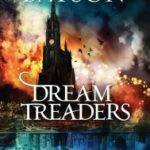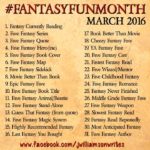Why I Don’t Like Sub-Genres
Urban fantasy, science fantasy, magic realism, dark fantasy, classic fantasy, epic fantasy, fairy tales. It all gets a little mind boggling, to be honest, and a little nichifying.
[As an aside, I just created the word “nichifying”—in the same way that author Gregory Spencer creates words for a people group in his Welkening novels. Must be catching! 😉 ]
Yes, nichifying. And honestly, I don’t like being shoved into a niche, or a stereotype. I don’t like being pigeonholed, categorized, classified, marginalized, or any such narrowizing.
Being labeled as a fantasy writer seems like part of the marketing/selling necessities. Identifying myself as a Christian fantasy author reveals my worldview, and therefore seems important. But from then on? I don’t like the divisions and the subdivisions.
What exactly do these additional terms give us? I suggest they give us separation.
I most enjoy epic fantasy, also known as high fantasy or classic fantasy. Does that mean I shouldn’t read Kathryn Mackel’s Birthright Chronicles, a science fantasy series? Or Robin Parrish’s superheros stories? If I had stayed within the bounds of the epic fantasy genre, I would never have discovered Watership Down (Richard Adams), one of my favorite books of all time. Or another favorite,Till We Have Faces by C. S. Lewis.
I guess I feel strongly about this labeling issue because I don’t like the implied message genre distinctions—and now these sub-genre distinctions—give to readers: These books are only for the sci fi geeks or These books are only for readers who want to lose themselves in a made up world.
But don’t good stories draw readers regardless of genre?
This might seem like an odd thing for someone passionate about fantasy to be saying, but I bristle at being nichified. The only niche I want to be in is that of good author. I’m not there yet. I’m not even in the published author niche, but that’s where I’d prefer to be, rather than in some other division that chases away readers.
Here’s why I love to write fantasy:
That’s it. But what those two points add up to as I see it, is writing Big.
I’ve plotted a contemporary story and written several chapters. It happens to be a story I believe in and hope to finish some day. I think it’s a Big story, too, so I’m not saying fantasy is the only way an author can create Big stories.
However, it seems to me fantasy requires Bigness.
But to bring this back to the original point, I believe the slicing and dicing of a genre into all the different sub-genres reduces this Bigness. Nichifying belittles the books forced into ever-shrinking categories for ever-reducing markets.
By comparison we might say cats are only for cat lovers—you animal lovers need not apply to be cat owners. How silly.
An edited version of an article originally posted at A Christian Worldview of Fiction February 8, 2008.









































The truth is genres have more to do with writers and publishers than with readers. Sure there are some who turn on Dean Koontz because he switches gears and writes an oddly funny novel like Relentless but even the complainers come back to him because, well, because he’s a good writer.
In spite of this, I see publishers keying on whatever sub-genre is hot at the moment to draw some of that group to their latest offering. That’s business I guess. Someone recently posted that Stephen Lawhead’s “The Skin Map” is science fiction rather than fantasy. Their reason, it involved time travel and plays out in the real world. So is Stuart Stockton’s “Star Fire” fantasy because it has talking reptiles and the “real world” is nowhere to be seen? The line aren’t that easy to be drawn and honestly shouldn’t be.
Sometimes the sub-genre tag expands the audience, rather than shrinking it. Let’s say that I despise fantasy, but love horror. If I see something that says dark fantasy, I might pick that one up. If I hate mystery and horror, but like romance, I might pick up a paranormal romance, even if they’re in the fantasy section.
Sub-genres and niches are an inevitable middle step to creating a new genre. What are now called “steampunk” and “dieselpunk” genres were once stuffed under the umbrella of speculative fiction, and yet, much of the spec-fic audience has no clue what either are, but science fiction fans almost certainly do.
As I use the words speculative fiction it is a super category which takes in science fiction, fantasy, fairy tales, horror and all the other speculations. That’s the way it is used around people I talk with. You seem to be using it in a different sense. How is science fiction NOT speculative fiction?
Tim, I think you’re right that the genre tags aren’t as much for readers as they are for those on the other side of the business. I remember years ago when fantasy was scarce, I had to ask at Borders if they had any. Oh, sure, it’s in the science fiction section. Huh?! In my mind, the two couldn’t be more different.
I also bristled when I learned that editors and agents didn’t want writers to say they were writing for “everyone” as if that’s an impossibility. I doubt seriously if Tolkien or Lewis thought in terms of writing to a narrow audience of whatever make up. I think they were simply writing the best stories they knew how to write, and not surprisingly, those books are universally acclaimed.
I see no reason society at large won’t love good stories, no matter what the sub-genre label might be. Think about the popularity of movies such as Avatar, or Star Trek. Go further back to Star Wars or Princess Bride or Ever After or Sixth Sense or ET or Back to the Future. Doubtful that the huge audiences went to those movies because they wanted “weird.” They wanted a good story told well and they found it, told their friends, and more people turned out.
I think by labeling our writing as “weird” or for the weird as some do, we are chasing away readers.
I think “nichifying” is a fantastic word.
Thanks, Rachel. I don’t know if you’re familiar with Gregory Spencer’s Welkening books. I reviewed the second Guardian of the Veil for Spec Faith (still over at the old site). He plays with language in such a fun way in sections of the book. I wanted to see more of those segments, but I began to realize how hard it would be to write like that for any length (it’s challenging to read, too). Fun though, to make up a word here and there as he did. Spencerizing, I guess I could call it. Or you could say my Gregory Spencer was some funation. 😀
Becky
Jeremy, I understand what you’re saying, but I think genre blending can work against a writer, too. A reader might say, well, I certainly like paranormal stories, but romance? There’s no way I’m reading a romance.
Your point about steampunk actually illustrates what I’m saying. It’s such a specialized term that even those with no qualms about reading imaginative literature such as fantasy might be turned off by it. Why would we purposefully narrow our audience? That’s what I think sub-genres do.
Becky
Becky,
You said, ” I understand what you’re saying, but I think genre blending can work against a writer, too.”
That was the thrust of your entire entry, yes. What I provided was simply an alternative perspective. Taking a look at your “paranormal romance” example, if it weren’t labelled as paranormal romance, it would most likely have shelved under romance, and wouldn’t have gotten into the hands of that particular reader anyway. Think of Anne Rice’s Vampire Chronicles. Had they been written in today’s market, they might have found spots in “paranormal romance,” “urban fantasy,” as well as the much less appropriate “horror” where it was consistently shelved.
Sub-genres let us escape what some call decision paralysis. Many good books are overlooked because they’re sandwiched into a genre with half a million brother and sister titles. Either the customer walks away, overwhelmed by the blurr of book-bindings, or they pick one title out of thousands, because the author’s last name just happened to start with the same letter as their favorite author.
It would be time-consuming for me to walk over to Barnes & Noble’s fantasy section in search of something “steampunk,” as fiction sections are not divided into topical sections as the non-fiction shelves are. Sub-genres are, essentially, the fiction section’s version of the Dewey Decimal system. I can log onto Amazon, search for “steampunk” and pull up a dozen titles that are very likely to interest me.
I guess I wasn’t looking at sub-genres as necessarily blended genres, so I really did think I was making a different point, Jeremy. Sorry if it seemed redundant.
Again I agree with you that the labeling into a small category can help those looking for that small category to find books that fit their niche. That doesn’t change the fact that many other readers are then shut out.
I’ve had friends ask me what dystopian meant and others disinterested in what was labeled “dark fantasy.” I’d rather be talking about what a good story the book is, not what genre it belongs to.
I think the labeling is more detrimental than it is helpful, but I’m just one person and obviously the professionals disagree. I’m sure they wouldn’t be labeling their books the way they do if they thought it was hurting sales.
As a case in point, though, I’ve seen some publishers who are members of the ECPA take off the “Christian” tag on the back cover of some books (which generally is there to show the bookstores where to shelve each title). I surmise that they believe the label “Christian” actually narrows their intended market.
Becky
Then again, those of us with insatiable curiosity follow new labels like will o’ the wisps. Steampunk? Dystopia? Urban fantasy? I’ve never heard of that! Where can I find some?
That’s why I can spend all day in the library. Sometimes I stop by the Dewey Decimal posters just looking for categories I’ve never heard of so I can go see what’s in them.
But then, I realize I’m not particularly normal.
😀 I’d say you’re … exceptional, Rachel! It’s a good thing!
And if everyone was like you, marketing would be a sight easier.
Becky
One of my first dabblings in writing fiction was in the sub-sub-sub genre of cattlepunk. Only a few of my friends read it. Publishing was out of the question.
Niches are something to be aware of, but only in a tangential way, as a way of adding flavor to something I’ve already decided to try.
I remember our local Christian bookstore’s attempt at nichifying back in the day when they used a secular group to match up to a Christian group they were trying to sell on their own shelves. “If you like Fleetwood Mac, you might like The Happy Goodmans.” It wasn’t an exact science. Things have gotten better. “If you like Switchfoot, you might like Switchfoot.”
Instead of confining myself to genre, I tend confine myself to quality. I read everything Mystery author Walter Mosley has ever written, but very few other mysteries. However, in the case of A. Lee Martinez, I am so in love with his hardboiled sci-fi noir “The Automatic Detective” that I haven’t read any of his other stuff. So it’s a tradeoff.
I guess since I don’t really think in terms of genre, to me they’re nothing more than descriptive terms – means of giving me some semblance of what to expect from it. I suppose it depends on if you see the wall as keeping people in or out. Dunno.